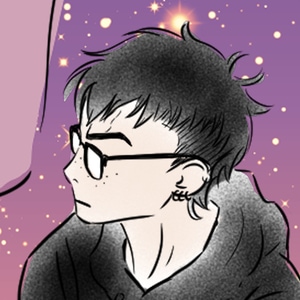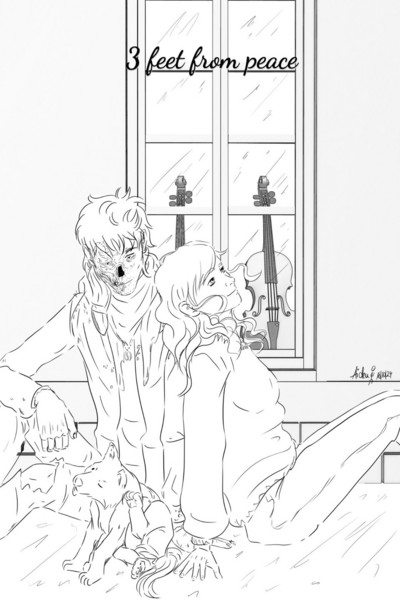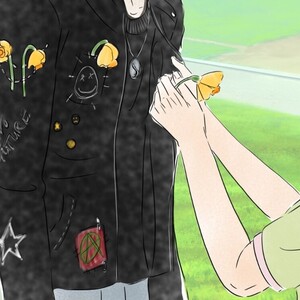Dark, heavy clouds are hanging over the old town. Erik, Gustave,
and Christine are sitting at the small solid wood table in the cozy,
warm kitchen above the Paganino, having dinner. It's a moment
that Erik finds hard to bear. Although he has lived here for some
time, he often still feels like a stranger, an intruder. Eating at
the table, as they do, still feels wrong to him. He is not used to
eating regularly and even less used to eating in peace, without the
constant glances over his shoulder. Without the constant comments.
The memories of living on the streets are still fresh in his
mind. On the street, you eat quickly, hastily, typically standing or
squatting, always making sure that no one takes your food. Even
though he is now sitting in a warm, safe room, the restlessness
remains.
And the shadow of his former life spreads over Erik like
a dark cloak. Too frequently, he had to eat the food he didn't want.
Too frequently, he had to praise the food and say it was good.
Regardless of whether he could digest it, it has to taste good - or
not. Too often, he was warned at the table.
It was simply eating and the
happiness of enjoying it too rare. This - coming together, cooking
together, celebrating a meal - is still unfamiliar to him.
But he is
willing to learn, just as he learned the art of violin making.
“The
room is not in use, you can have it,” says Gustave calmly as he
pours the potato soup out of the steaming pot. He passes the bowls
around and leaves it up to Erik to add the sausages to his soup
himself. Since Christine doesn't eat meat, the extra sausage is
served separately. Thoughtfully, the punk drops a few chopped
sausages into the soup and begins to eat.
“But I can't pay for
it,” Erik finally mumbles and continues to spoon up his soup. With
his free hand, he repeatedly dabs a napkin over the open spot at the
corner of his mouth. It is an unconscious reflex that he has
developed over the years. He feels uncomfortable. The worry that she
might find him repulsive, the fear of spoiling her appetite,
accompanies him with every bite.
Christine watches him out of the corner of her eye. She has gotten
used to Erik's face by now. At first, she found it difficult to
recognize the person behind the face. But over time, her view of him
is no longer characterized by the painful strangeness she felt
before. She knows that he is ashamed of something he can't be blamed
for. She knows that his nervousness is not just due to external
circumstances - she senses that he is completely uncomfortable in his
own skin, especially in front of her. It took her a while to
understand that Erik avoids being touched, but not because he
fundamentally rejects it. It is more a kind of protection, a boundary
that he sets for himself. Only with her, with Christine, does this
boundary seem particularly thick and impenetrable. She can't explain
why it is like that.
“I can't pay for it,” he repeats
quietly, just to convince himself. But Christine hears the subtext,
the hesitation in his voice. She knows that it's not just about
paying. It's about much more - the insecurity he still has, the
feeling of not being enough, the constant fear of demanding too much
or becoming an unnecessary weight in her life.
He looks up for a second, meets her gaze, then turns back to the
plate. “It's okay,” she finally says, trying to break through his
thoughts. “You don't have to pay for it, Erik. It's... Okay.” And
even if her words are sincere, she is not sure if he believes her.
It's hard to give something to someone like Erik without him feeling
obligated. And she knows that he still can't really believe that they
just accept him for who he is.
At that moment, she notices
something - it's not just what he says or does, but the way he keeps
retreating into himself. The way he apologizes for everything he
needs or is given. As if he wasn't worth it. Almost as if he's still
waiting for the moment when everything will be taken away from him
again, as if it's too good to be true.
“You work here,” Gustave says simply, as if that were the
explanation for everything. Almost like it's a given that Erik
doesn't have to pay for his accommodation and food.
“Yes, the
three violins... I know...”, Erik grumbles, wanting to put the
subject to the side.
“Älskling, he doesn't understand,”
grumbles Gustave.
“To be honest, neither do I, Dad,” Christine
admits with a soft smile. “Dad speaks in riddles,” she adds
quietly, giving Erik a mischievous look.
“Maybe this is another
one of his strange tasks,” jokes Erik, sinking a piece of bread
into the soup. It's a little joke, a gentle attempt to confront the
insecurity that keeps coming over him. “Come on Erik, you have to
steam the wood first, then bend it and at the end you have, TADAAAA
en violin,” Christine mimics her father with a laugh.
“Kids!” Gustave finally growls, gets up and leaves. The
violin maker's heavy footsteps echo through the hallway, and then the
stairs creak as he goes downstairs. It is quiet for a moment, only
the soft panting of Sasha can be heard. Then Gustave reappears,
placing a folder on the table right next to Erik's bowl.
“I wanted to wait until Christmas,” Gustave explains calmly.
“But I'm tired of waiting.” He opens the folder and places a bank
account in front of Erik. The account is new. Two months old,
Erik realizes immediately, leans forward and looks at the figures.
“The insurance paid for violins. So this is your payment,”
Gustave continues, ignoring the astonished look on Erik's
face.
“W...what?” Erik stares from the bank statement to
Gustave. The thought of being paid for his work, of being considered
not just a helper but a real worker in this business, is strange to
him. It feels like a dream, like a misunderstanding.
“You've
been working off the violins for a long time. You have talent, I've
told you that many times,” says Gustave, without hesitation. “You
have skillful hands, you're reliable and you learn quickly. I'd like
to hire you officially.”
“A... but... why?” asks Erik, who
still doesn't quite understand what's happening here.
Why me, out of all people? Why someone like me?
Gustave looks helplessly at Christine, “He's asking WHY? Älskling!”. She nods at him and then looks at Erik. “I think what Dad is actually trying to say is: we've grown fond of you, and now he wants to bind you to him with a contract.”
“Älskling!” protests Gustave, but Christine laughs softly and
looks at Erik in a challenging way. “He's serious,” she says
emphatically.
Erik looks at the folder and then back at the two
of them. The words resonate in his mind and after a moment of
silence, he finally asks:
“Where do I have to sign?”
It's
not just signing a contract. It's about trying to find a place in
this world that could not only give him a job, but also a
home.
Christine nods and Gustave grins broadly.
“Welcome to
Paganino, Pojke,” he says. He wants to reassure Erik that he
is more than just a worker in this place. That, no matter how he
feels, he really belongs.











Comments (0)
See all